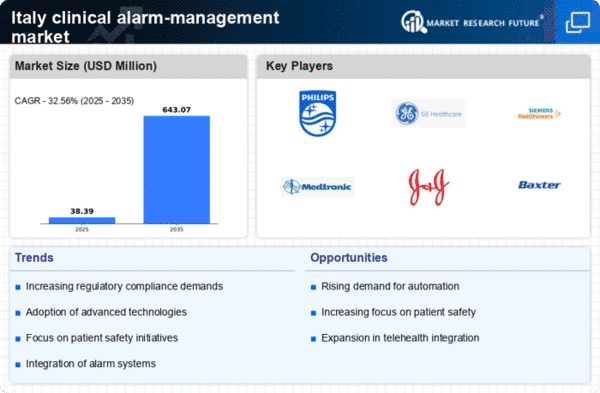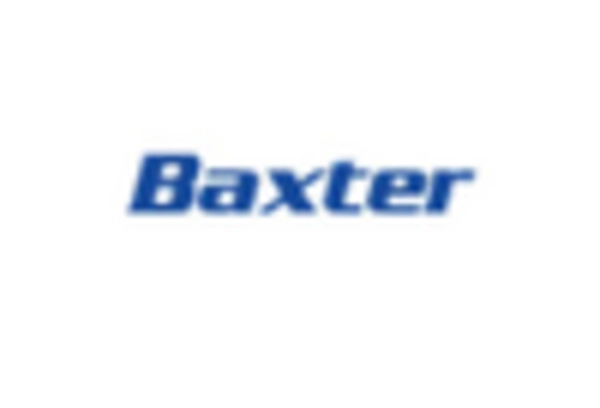Growing Awareness of Alarm Fatigue
There is a rising awareness of alarm fatigue among healthcare professionals in Italy, which is significantly impacting the clinical alarm-management market. Alarm fatigue occurs when clinicians become desensitized to frequent alarms, leading to potential oversights in patient care. Recent surveys indicate that over 50% of healthcare workers report feeling overwhelmed by alarm notifications. This growing recognition of the issue is prompting healthcare facilities to seek innovative solutions that can effectively manage alarm systems. By addressing alarm fatigue, organizations can enhance patient safety and improve clinical outcomes, thereby driving demand for advanced alarm management technologies in the market.
Increased Focus on Healthcare Efficiency
The clinical alarm-management market in Italy is being propelled by a growing emphasis on healthcare efficiency. As healthcare costs continue to rise, institutions are seeking ways to optimize operations and reduce waste. Effective alarm management is seen as a critical component in achieving these goals, as it can lead to better resource utilization and improved workflow. Studies suggest that implementing efficient alarm systems can reduce alarm-related interruptions by up to 40%, thereby enhancing staff productivity. This focus on efficiency is likely to encourage healthcare providers to invest in advanced alarm management solutions, thereby fostering growth in the clinical alarm-management market.
Rising Demand for Patient Safety Solutions
The clinical alarm-management market in Italy is experiencing a notable surge in demand for solutions aimed at enhancing patient safety. Hospitals and healthcare facilities are increasingly prioritizing the reduction of alarm fatigue, which has been linked to adverse patient outcomes. According to recent data, alarm-related incidents contribute to approximately 30% of sentinel events in healthcare settings. This alarming statistic underscores the necessity for effective alarm management systems that can streamline alerts and minimize unnecessary notifications. As healthcare providers strive to improve patient care quality, investments in advanced alarm management technologies are likely to rise, thereby propelling the clinical alarm-management market forward.
Regulatory Pressures and Compliance Requirements
Regulatory pressures are increasingly influencing the clinical alarm-management market in Italy. Healthcare organizations are required to comply with stringent regulations aimed at ensuring patient safety and quality of care. The Italian Ministry of Health has established guidelines that mandate the implementation of effective alarm management protocols. Non-compliance can result in significant financial penalties and reputational damage. As a result, healthcare facilities are compelled to adopt comprehensive alarm management systems that align with these regulations. This compliance-driven approach is expected to stimulate growth in the clinical alarm-management market as organizations seek to meet regulatory standards.
Technological Advancements in Monitoring Systems
Technological innovations are significantly shaping the clinical alarm-management market in Italy. The integration of sophisticated monitoring systems, such as wearable devices and remote patient monitoring, is enhancing the ability to manage alarms effectively. These systems can provide real-time data, allowing healthcare professionals to respond promptly to critical situations. The market for remote monitoring solutions is projected to grow at a CAGR of 15% over the next five years, indicating a robust shift towards technology-driven healthcare. This trend not only improves patient outcomes but also optimizes resource allocation within healthcare facilities, further driving the clinical alarm-management market.
















